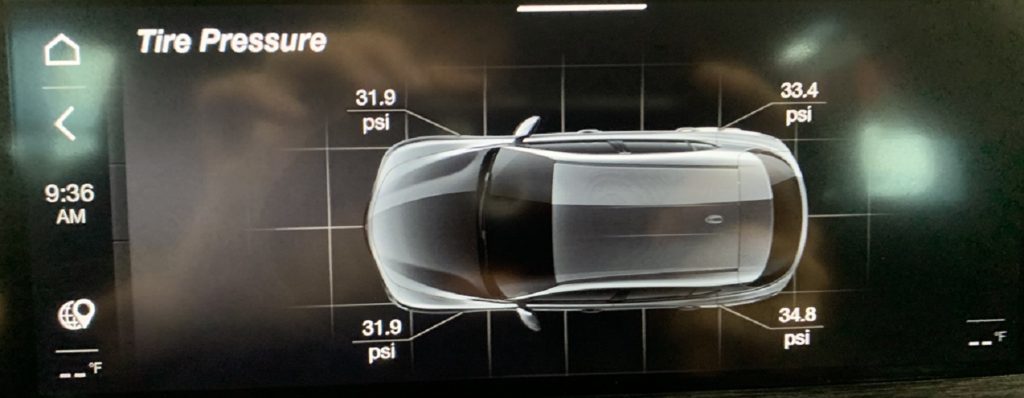If you live in a region that has seasons, you may have noticed that your tire pressure seems to decrease during the winter months. Tire pressure can fluctuate for a variety of reasons, but one of the most common causes is the changing temperature of the outside air. As the temperature dips, drivers should be aware that their tire pressure may fluctuate more frequently than normal. This is due to the fact that cold weather can cause the air inside your tires to contract, leading to a drop in tire pressure. Ding! Tire pressure light on the dash goes on!
What are the Causes?
 A variety of contributing elements cause tire pressure to decrease during colder weather conditions. Being aware of these things will help you keep your vehicles tire pressures at the correct levels, which is vital for vehicle fuel economy and vehicle performance.
A variety of contributing elements cause tire pressure to decrease during colder weather conditions. Being aware of these things will help you keep your vehicles tire pressures at the correct levels, which is vital for vehicle fuel economy and vehicle performance.
Temperature fluctuations are one of the primary causes for a decline in tire pressure. When the temperature of your tires drops, the air inside them becomes more condensed and takes up less space. Due to the decrease in volume, when a tire gets colder, it implies that an equal amount of air will occupy lesser space. This translates into less pressure inside the tires.
The Science
Lets talk about the science behind temperature and tire pressure. When the outside temperature decreases, the pressure inside a tire also decreases. This is due to the ideal gas law. The ideal gas law states that the pressure of a gas is inversely proportional to its volume at a constant temperature. In short, the lower a gas’s volume is, the higher its pressure will be. And conversely, when a gas’s volume increases it results in decreased pressure.
Charles’s law states that volume and temperature are inversely proportional to each other, as long as the pressure remains the same. This means that when a gas is heated, its volume increases proportionally in degrees kelvin. This then means that as the temperature of a gas increases, its volume also increases.
In the case of a tire, the air inside the tire is at a constant pressure, but the temperature can vary. When the temperature outside the tire decreases, the temperature of the air inside the tire also decreases. Because the temperature of the air inside the tire also decreases, its volume decreases, causing the pressure inside the tire to decrease as well. Evidently, this is why the tire pressure in a vehicles tires can and will decrease in cold weather.
What about the summer?
The effect of temperature on tire pressure is not just limited to the cold! In the summer months, with higher temperatures, the opposite will occur. Warmer air causes the air inside your tires to expand, leading to an increase in pressure. This is why it’s important to check your tire pressure regularly, as the ideal pressure for your tires may change throughout the year. Here is an article on how to check tire pressure and why its so important.
Other Factors
 Another factor that can contribute to the drop in tire pressure in the winter is the type of tire you are using. The type and size of your tires can have a considerable impact on the performance of your vehicle, as well as how it responds to fluctuations in temperature. For example, tires with a lower profile, such as performance tires, tend to be more sensitive to temperature changes. This is because they have less air volume, so the same temperature change will have a greater impact on their pressure.
Another factor that can contribute to the drop in tire pressure in the winter is the type of tire you are using. The type and size of your tires can have a considerable impact on the performance of your vehicle, as well as how it responds to fluctuations in temperature. For example, tires with a lower profile, such as performance tires, tend to be more sensitive to temperature changes. This is because they have less air volume, so the same temperature change will have a greater impact on their pressure.
Tire Inflation Importance
It is especially essential to ensure your tires are correctly inflated from the jump. If your tires are under-inflated, they will be more susceptible to changes in temperature and pressure. On the other hand, if your tires are over-inflated, they may be more inclined to punctures and other damage.
To ensure your tires are properly inflated, its a good idea to check your tire pressure regularly, using an accurate tire pressure gauge. We recommend checking your tires pressure at least once a month. You can find the required tire pressure for your vehicle in the owner’s manual or on the placard located on the inside of the driver’s side door.
Conclusion
In conclusion, tire pressure diminishes in the winter since cold weather causes the air inside your tires to contact. This effect is compounded by the type of tire you are using, as well as the initial tire pressure. By keeping an eye on your tire pressure and making sure that your tires are properly inflated, you can help to ensure that your tires are safe and ready to handle whatever the winter weather throws your way.
